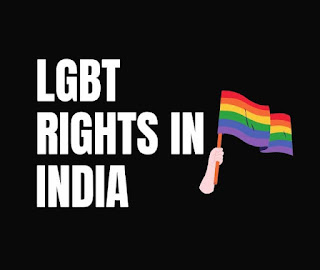LGBT Rights in India – India, a diverse nation known for its cultural heritage, is gradually progressing towards inclusivity and equal rights for all individuals. The LGBTQIA+ community, which encompasses lesbian, gay, bisexual, transgender, queer, intersex, and asexual individuals, has long fought for recognition and acceptance.
This article aims to shed light on the LGBT Rights in India and the progressive steps taken by the country toward creating a more inclusive society.
1. Decriminalization of Homosexuality
Historically, India's legal stance on homosexuality was regressive. However, in a landmark judgment in 2018, the Supreme Court of India decriminalized consensual same-sex relationships. The ruling overturned Section 377 of the Indian Penal Code, which criminalized "unnatural" sex acts. This decision marked a significant milestone, ensuring that LGBTQIA+ individuals could live without the fear of prosecution.
2. Right to Privacy
The Supreme Court of India, in a separate ruling in 2017, recognized the right to privacy as a fundamental right. This judgment was instrumental in upholding the dignity and autonomy of LGBTQIA+ individuals, emphasizing that sexual orientation and gender identity are personal matters and should not be subject to societal judgment or interference.
3. Employment Rights and Non-Discrimination
In recent years, efforts have been made to protect LGBTQIA+ individuals from workplace discrimination. The 2014 ruling by the Supreme Court recognized transgender individuals as the "third gender" and provided them with equal rights in employment and education.
Additionally, various state governments and private corporations have implemented policies to prohibit discrimination based on sexual orientation and gender identity. These measures aim to ensure equal opportunities and a safe working environment for all individuals.
4. Healthcare and Gender-Affirming Measures
Recognizing the unique healthcare needs of the LGBTQIA+ community, India has taken steps to provide accessible and inclusive healthcare services. The Transgender Persons (Protection of Rights) Act, 2019, mandates that all hospitals and healthcare providers must offer gender-affirming healthcare, including hormone therapy and gender reassignment surgeries. These provisions are crucial in addressing the medical needs of transgender individuals and promoting their overall well-being.
5. Adoption and Parenting Rights
According to India’s Adoption Regulations, 2017, as published on the official website for the Central Adoption Resource Authority (CARA), couples who have been married for at least two years, as well as single women,
- can adopt a child of any gender
- while a single man is eligible only to adopt a male child. source : thePrint
Since same sex-marriage is still illegal in India, the collision between being unable to have a registered marriage and desiring a child prohibits homosexual couples from adopting a child. Although one of the partners can adopt a child as a single mother or father, this will completely sideline the legal rights of another parent on the child.
Unfortunately, couples in live-in relationships, same-sex couples and transgender individuals don't have adoption and parenting rights. source : FII
6. Social Acceptance and Awareness
While legal recognition is a significant step forward, creating social acceptance and awareness is equally vital. Various LGBTQIA+ advocacy organizations and support groups are actively working to promote inclusivity, provide counseling, and offer a platform for dialogue. Pride parades and other community events have gained momentum in several cities, fostering a sense of belonging and encouraging societal acceptance.
Conclusion
India has come a long way in recognizing and protecting the rights of LGBTQIA+ individuals.
- The decriminalization of homosexuality,
- Recognition of the right to privacy,
- Employment rights,
- Healthcare provisions,
- Parenting rights,
- Efforts to foster social acceptance have contributed to a more inclusive society.
However, there is still work to be done to combat discrimination and ensure the full realization of LGBTQIA+ rights. By continuing to promote awareness, education, and dialogue, India can further advance towards a future where everyone, regardless of their sexual orientation or gender identity, is treated with dignity, respect, and equality.


